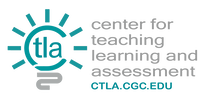The faculty of CGCC have identified four General Education Student Learning Outcomes:
Critical thinking is the process of appropriately analyzing, evaluating, applying and synthesizing information. It is characterized by reflection, connection of new information to existing knowledge and reasoned judgment.
Indicators
- CT.1: Application
- Students can apply knowledge and skills in a different context or situation or task.
- CT.2: Analysis
- Students can organize information into its component parts.
- Students can identify relationships within information and its component parts.
- CT.3: Synthesis
- Students can assemble parts or components to create a whole.
- Students can originate through the use of parts or components.
- CT.4: Evaluation
- Students can assess the relative value of ideas and information.
- Students can justify their conclusions.
Effective speech communication is the purposeful development, expression, and reception of a message through oral and nonverbal means.
Indicators
- OC.1: Message Delivery
- Adapt the delivery of the message in context.
- How thorough and with what completion have students adapted the delivery of the message in context?
- OC.2: Audience Analysis
- Adapt the message for an audience.
- How effectively have students adapted the message for an audience?
- OC.3 Message Purpose
- Adapt the message to meet the purpose(s)
- How effectively and consistently have students adapted the message to meet the purpose(s)?
- OC.4: Verbal Interaction
- Adapt effective language in the conveyance of ideas and information.
- How effectively and with what quality have students adapted language in the conveyance of ideas and information?
- OC.5: Non-Verbal Interaction
- Utilize Paralanguage (tone, rate, volume, inflection, etc.).
- Utilize Kinesics (facial expression, gestures, and overall movement).
- How well can students apply Paralanguange and Kinesics?
- OC.6: Presentation Graphics Support
- Apply graphics to support presentation.
- How effectively do students apply graphics support to the presentation?
Information literacy is the set of integrated abilities encompassing the reflective discovery of information, the understanding of how information is produced and valued, and the use of information in creating new knowledge and participating ethically in communities of learning.
Indicators
- Inquiry Process
- IL.1.A: Adapt the delivery of the message in context.
- IL.1.B: How thorough and with what completion have students adapted the delivery of the message in context?
- IL.1.C: Formulate questions for research based on gaps or on reexamination of conflicting information.
- IL.1.D: Determine an appropriate scope of investigation.
- IL.1.E: Organize information in meaningful ways.
- IL.1.F: Determine the initial scope of the task required to meet their information needs.
- IL.1.G: Match information needs and search strategies to appropriate search tools.
- Contextual Authority
- IL.2.A: Monitor gathered information and assess for gaps or weaknesses or multiple perspectives.
- IL.2.B:Analyze materials for audience, context, and purpose.
- IL.2.C:Determine the credibility of sources based on author, content, format, assignment need, etc.
- Creation Process
- IL.3.A: Contribute to scholarly conversation at an appropriate level.
- IL.3.B: Synthesize ideas gathered from multiple sources.
- IL.3.B: Draw reasonable conclusions founded on the analysis of information.
- IL.3.B: Develop an understanding that their own choices impact the purpose for which the information product will be used and the message it conveys.
- Ethical Use
- IL.4.A: Give credit to ideas of others through proper citation and attribution.
Personal development involves engaging in life-long learning processes resulting in behaviors promoting student success as well as contributing to building a more equitable, empowered community and society in general through informed decision-making and responsible actions.
For proficiency, students will demonstrate the following as appropriate to discipline, course, or level of engagement:
Indicators
- PD.1: Recognizing learning as part of a process that includes continued development while identifying lessons learned and strategies for improvement.
- PD.2: Setting and monitoring short term and long-term goals.
- PD.3: Recognizing the role of behaviors, emotions, attitudes, and relationships in personal, academic, and community success and well-being.
- PD.4: Engaging in reciprocal process(es) that lead to identifying and seeking deeper understandings of community needs and stakeholders.
- PD.5: Contributing to the building/shaping of a more equitable, empowered community and society by developing positive relationships based on mutual respect and understanding.
- PD.6: Collaborating with community stakeholders identifying/creating plan(s) of action responding to identified needs based on informed decision-making.
- PD.7: Identifying actions taken to better one’s self, community, and society based on informed decision-making.
- PD.8: Engaging in ethical and responsible actions that are mutually beneficial to all stakeholders.

